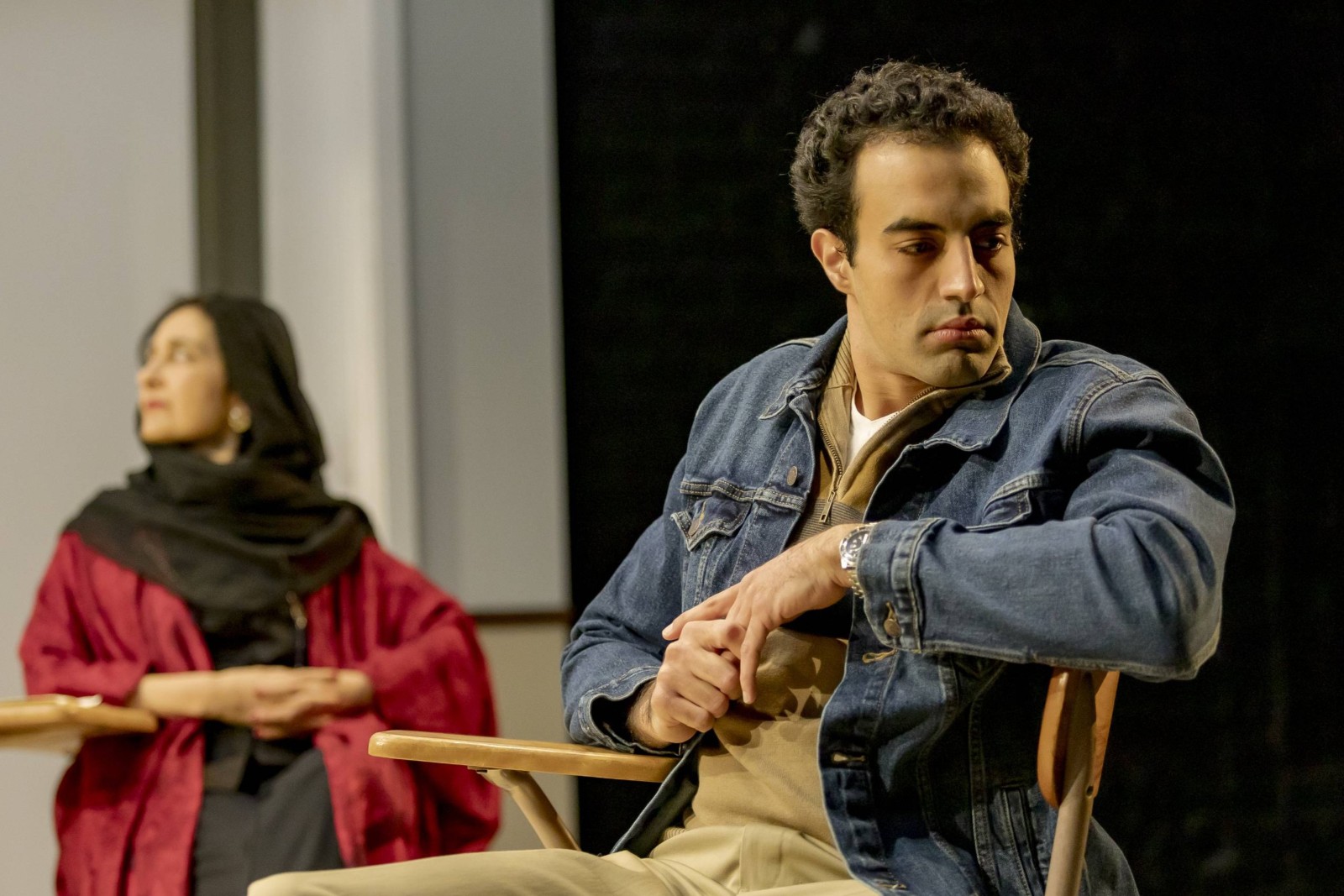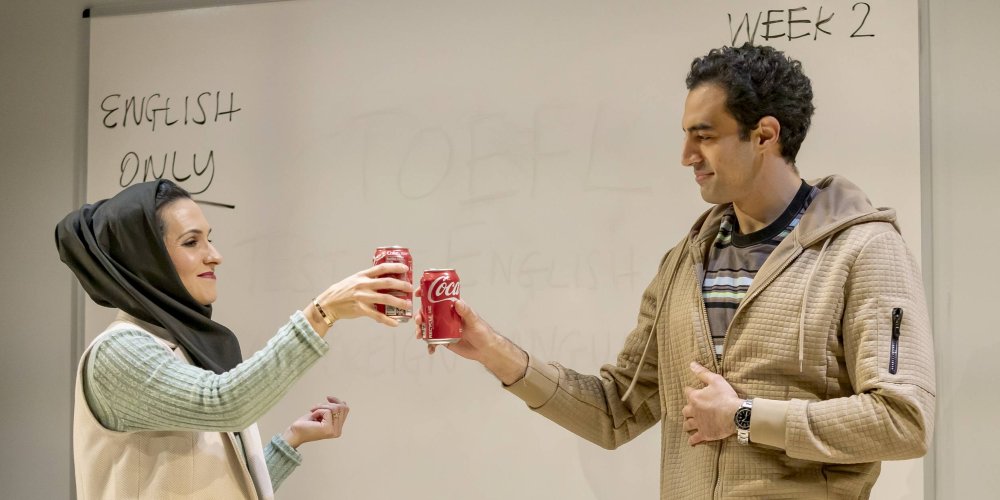Equity News Magazine
Equity News is the official magazine of Actors' Equity Association. Equity News has been around in a variety of formats since 1915.
Equity Member Fady Demian on Performing in 'English'
Equity member Fady Demian recently concluded a run as Omid, a student in an English class in Iran in English at Cincinnati Playhouse. He shared some thoughts with Equity News on what it meant to him as an immigrant to perform in a piece about cultural and linguistic divides and the emotional brunt that those who want to better their lives bear. This essay accompanies an article about Equity members working on productions across the country that speak to making art in a time of political upheaval.
This play is very timely and reflective of our current political state. Politics are not discussed in the play's classroom, but the play is inherently political in its exploration of identity and language. For example, English became the official language of the United States while we were performing, which further reflects attempts at discriminating against and rejecting minority groups and immigrants who are more fluent in another language, thus diminishing and demeaning the value of such a language.
It is a testament to how immigrants are further distanced and othered in this country, and what people have to go through in order to learn this language. Immigrants who are very much American through citizenship or permanent residence may still not be regarded as such, simply because of their native tongue and accent, which is a major theme of this play. It is very clear in the state of our current world that different identities go unacknowledged and bridges between communities are being broken metaphorically. With every new event in recent news, the climate of inclusivity seems to be getting destroyed. This story asks of us, how can we accept and embrace what is considered different rather than alienating "otherness"?
The multitude of harrowing acts that ICE (Immigration and Customs Enforcement) has committed recently are blatant examples of the othering and alienation of immigrants happening in the United States. This fight for belonging and acceptance into an idealized Western society is something my character struggles with, and now within the current political climate, we are constantly reminded that the American Dream seems to not be made for certain groups of people.

Equity members Fady Demian and Leyla Modirzadeh in background in English at Cincinnati Playhouse in the Park. Photo by Mikki Schaffner.
What's truly tragic is that this American ideal starts to breed a delusional goal, where the only sense of validation and self-worth is determined by our assimilation into Western culture. This ultimately leads to an inferiority complex and condition of self-hate, self-rejection, as we start to firmly associate our identity with the English language and culture, thus abandoning our own traditions, accents and language. It is a process of self-erasure or self-erosion, in order to assume an identity that is deemed superior. However, throughout the course of the play, that ideal starts to shatter, the notion of what is considered superior starts to fracture, and a desire to return to our roots, our native language, starts to emerge.
In that sense, through a very basic human experience of learning language in a classroom, the play is infused with a desire for political reform. From having talkbacks and engaging with audience members after the show, I've learned what this story is doing to those who are completely unfamiliar with the ethnic identities portrayed in this play. It is humanizing those who are seen as "foreign," "other" or "alien" in the U.S., and it is making audiences more aware of their privilege as they realize what people are forced to go through in order to learn English just to enjoy the same basic American rights as they do. The psychological toll on identity and self-perception that learning a new language out of necessity takes on a person is unearthed in this classroom.
It all comes down to a very basic need, the need for belonging and acceptance, the need to be liked and embraced, and the question that many characters battle in this play is – what language, what identity, what voice, what accent, what persona, will allow me to feel at home, ultimately, within myself? What language will I be accepted in? And when a community does not make you feel accepted, how can you find acceptance within yourself? Ultimately, for every multilingual or hyphenated person, the question is, where should one set their roots? Where should home be? Where can we find the most peace and happiness? Is it in our native language, and the land of our ancestors, or a place that seems to promise success, progress, desirability and a prosperous future? Is it possible to merge both identities within one person? Or can you only ever be one at a time? As one audience member brilliantly asked, what language do you dream in? And so the play asks of me, is it in the language my mother gave me, the language of my cultural and ethnic identity? Or is it in the language of the American Dream?
Therefore, the play explores the complicated nature of what it means to be American or not American in a world which idolizes American culture and shuns everything else. This ultimately causes alienation within one's own hyphenated identity, self-worth and self-perception, a cultural fracture and linguistic divide in one's own mind, heart and soul. The language becomes an extended metaphor or manifestation of identity, culture, and the customs, practices and beliefs that our mothers gave us. Language becomes an extension of family. And if our language is alienated by the American dream we so admire, cherish and chase validation from, then we start to alienate our own families and what they represent within ourselves. We start to alienate our own culture and identity, we start to shame and self-loathe, until we are dispossessed from ourselves. Who are you if you are not embraced by the identity you so admire? That is the sacrifice, cost and pain immigrants have coming to this country. They are faced with a choice: to assimilate and alienate their family and heritage, or to not assimilate and thus be alienated by others here. And ultimately, what is it like to embrace the duality of identities? Either way, there is a loss. Either way, there will be a cultural erosion of some sort. Either way, there is alienation present. Either way, there is loneliness.
Banner image: Equity members Neagheen Homaifar (left) and Fady Demian in English at Cincinnati Playhouse in the Park. Photo by Mikki Schaffner.


Leave a commentOrder by
Newest on top Oldest on top